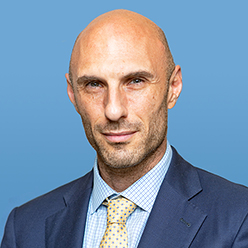As the White House considers taking military action against Syria for its use of chemical weapons against innocent civilians, the president has turned to Congress to authorize airstrikes. Lawmakers weighing their decision on the most consequential policy vote since the 2002 authorization for war in Iraq should encourage the President to also consider using an additional tool to force the Syrian regime to change course: stepping up economic warfare against Syrian banks and institutions that do business with them.
While sanctions are not a silver bullet, properly targeted, they might yet succeed in pressuring the regime to change its ways. Cutting off banks inside Syria and in other parts of the world that are helping the Assad regime gas its people and circumvent the already existing international sanctions regime, which includes an asset freeze, travels bans and oil restrictions, should be a top priority for legislators on both sides of the Atlantic. This type of effort can have measurable policy impact for a simple reason: the Assad government needs money. Without hard currency and access to the international market, the regime will find it far more difficult to fund its part in the civil war and its ability to purchase Russian-made weapons will be limited.
Syria has twenty-four financial institutions, many of them with correspondent banking relationships in Europe, Asia and the Gulf. The symbiotic relationship between the Syrian government and its banking sector enables the regime to maintain access to foreign currencies and markets by exploiting its banks.
As an example, according to recent news reports, three Russian banks — VTB Bank, Vnesheconombank (VEB) and Gazprombank (GPB) — have transacted business through the Commercial Bank of Syria in order to buy arms for the Syrian regime. The Commercial Bank, along with the Syria International Islamic Bank, are blacklisted by the U.S. Treasury Department for proliferating weapons of mass destruction. Furthermore, the three Russian banks all have correspondent relationships with U.S. and European banks, and like most international financial institutions, they need this type of access to operate globally. This gives Washington and the Europeans the power to force these banks, and others like them, to choose between doing business with the Assad regime or the West.
U.S. lawmakers have an important role to play in deciding how the administration will engage in economic warfare. Congress should start by pressing the U.S. Treasury to expand its sanctions program beyond the two Syrian banks already blacklisted and designate any Syrian bank providing comfort and support to the regime's powerbrokers.
It should also pass legislation similar to the Comprehensive Iran Sanctions Accountability and Divestment Act, which, if enforced, would compel all international banks doing business with the United States to choose between the American financial market and illicit Syrian banks. Banks that chose sanctioned Syrian institutions would face serious punishment. Among other things, the Justice Department could close down any branches they maintain on American soil or force a sale of all their U.S. assets. But it is not enough to put these laws on the books: Obama administration enforcement remains the key to success.
Responsible financial institutions have a role to play as well. In the United States, banks would be wise to implement programs not only to help them determine who they are doing business with, but to ensure their correspondents around the globe are not providing financial services to any entity on the Treasury blacklist, including those banks in Syria. There are approximately 250 financial institutions in places like Iran, Sudan, Venezuela and China that are blacklisted for illicit activity, which includes proliferating weapons of mass destruction and sponsoring terrorism and narco-trafficking. While American financial institutions are not doing business directly with designated banks, they are effectively exposing themselves to massive risk by doing business with banks that are.
Additionally, Assad and his cronies have reportedly amassed as much as $25 billion, stashed in banks and other investments around the globe. Freezing those assets would go a long way to ensuring that individuals and institutions associated with the Assad regime felt the financial pain.
Blacklisting financial institutions and seizing the Assad regime's personal wealth would require close collaboration with European and Asian allies. Achieving this level of cooperation has clear benefits, including not having to go before the United Nations Security Council, where Russia has already said it would veto any Syria resolution.
Considering airstrikes alone hampers America's ability to engage in a thoughtful strategy for what have become complicated challenges. Crafting a holistic approach to dealing with Syria's civil war and the deployment of weapons of mass destruction should also include activating a strong economic warfare component. There are those who will accuse the United States of imposing its diplomatic will through economic warfare to dictate its foreign policy. And they would be right, but there is no shame in using financial means to pursue those who use weapons of mass destruction. Doing so would, without endangering American blood or treasure, send a resounding message to the world — perhaps more effective than any bombing campaign — that the United States will not stand for Assad's use of chemical weapons. Syria is vulnerable to economic warfare, which would hurt the regime where it is weakest: its pocketbook.
Avi Jorisch is a senior fellow at the American Foreign Policy Council and a former U.S. Treasury official.
Want these sent to your inbox?
Subscribe
In Syria, Go After Banks Before Bombs
Related Categories:
Middle East
